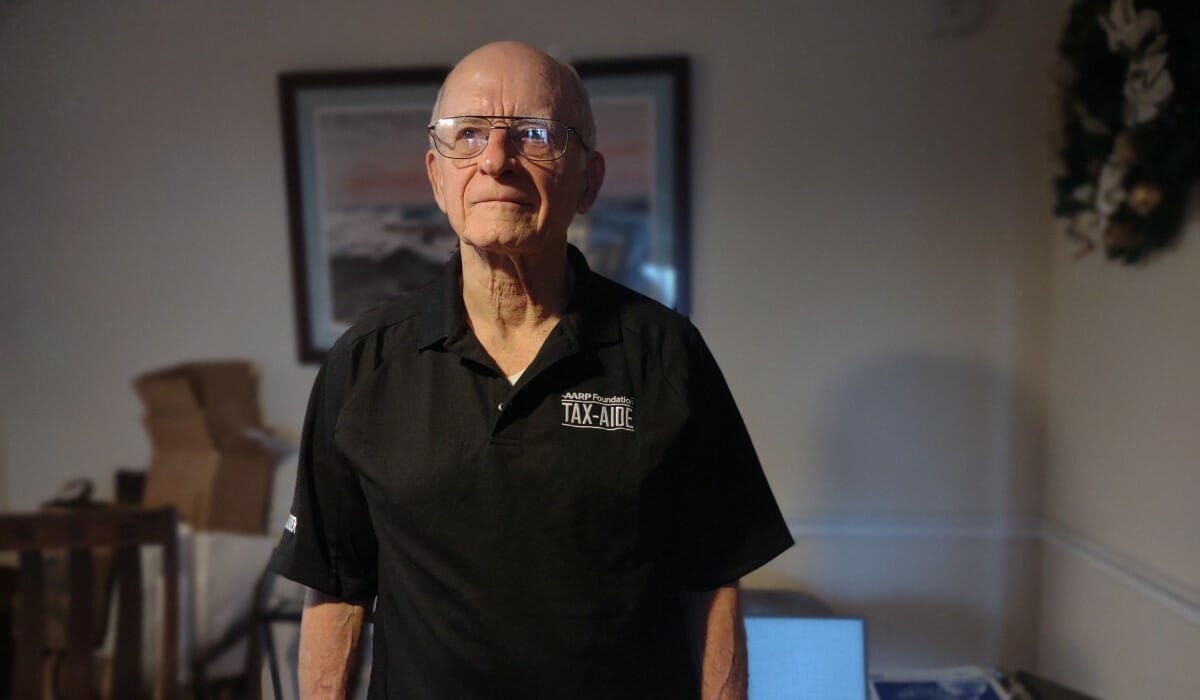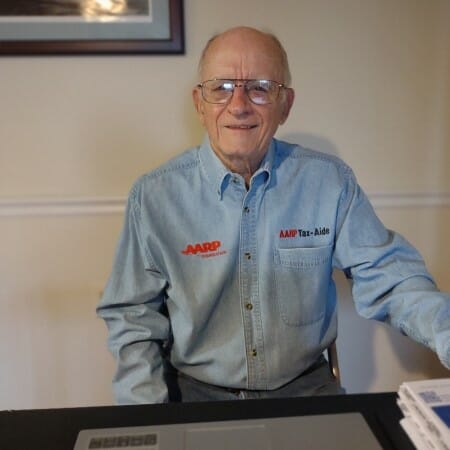81-Year-Old Retiree Helps Bring Accessibility to Taxes

Meet Daily Point of Light Award honoree William Hicks. Read his story and nominate an outstanding volunteer or family as a Daily Point of Light.
After retiring in Gaithersburg, Maryland, 81-year-old William Hicks stays busy providing free tax preparation and training to his community. As a leader in the AARP Tax-Aid program, Hicks gives tax support to low-income and senior residents year-round.
Hicks supported over 20 in-person tax preparation sites that generated more than 4,500 returns, but the COVID-19 pandemic changed everything. Hicks quickly planned, organized, and executed the contactless Alternative Tax Preparation (ATP) Program in Maryland to keep tax resources accessible for those in need of support.
Describe how you first got involved with tax preparation and AARP?
In 2004, I was retired for the second or third time, and was looking for something to do to volunteer and I was always interested in taxes. So I started volunteering in the tax aid program at AARP — we were doing returns with paper and pencil in those days. We’ve evolved through the computer and the internet.
I quickly became involved with training and I did trainings for 100 volunteers in Virginia, and then moved here to Maryland and continued volunteering. I prepare taxes and I’m also the state training coordinator for the tax aid program in Maryland as a Maryland State training specialist. I volunteer at a number of different tax sites and prepare taxes four days a week, usually. When COVID-19 was bad, it was a little bit different, but three or four days a week is normal and I enjoy it.
Can you explain how your volunteer activities have grown?
Well, I started out in the tax aid program as a volunteer who helps file taxes. In order to help prepare, you have to pass an IRS certification and also a state tax certification. The IRS provides the test for the federal certification and the local or state organization provides the test for the state certification.
But in my initial efforts in Virginia, I was the training coordinator for a district with about 250 tax preparers. So every year, we put on training programs for 250 tax preparers. Then I moved over here to Maryland, and did some of the same thing for a little while. And then I got involved at the state level. At the state level, I was the state coordinator, which really means that I prepared training, tests and certification processes that are used by the other instructors across the state. I also help train individual volunteers and set them in the background as sort of advisors and backups when there are questions and issues.

Can you explain the No-Contact Alternative Tax Preparation (ATP) Program and how you helped execute it across Maryland?
The ATP was a kind of spin-off IRS program particularly during COVID-19, since we were not going to be able to meet with people in person. It was a program that took advantage of the IRS free filing initiative with the commercial tax preparers. And basically it makes free filing programs, such as TurboTax, easily accessible to taxpayers. And so we facilitated the volunteer finding for those programs, and then we interacted with them as they prepared their own taxes to try and help them gain enough confidence so that, you know, [the] person who’s doing her own taxes can feel confident that she knows what she’s doing.
What inspires you to volunteer?
I was looking for something to stay busy that was going to be a bit challenging. And the appreciation and the interaction with the taxpayers is very valuable. The taxpayers that we serve are mostly either low-income or seniors, and they really don’t have the resources to go pay for prepared work. But the tax returns we do are relatively simple, although the most significant thing we do is rental, but [we do] almost any other things if they have investment accounts and retirement accounts.
Volunteerism is just the ability to feel like you’ve done a good deed for the day, so to speak; that you have helped the taxpayer who otherwise might not get the help, or who might find themselves in a storefront where they get a tax return that ends up getting them in trouble. It’s just a good feeling. And it’s a good, good thing to get to stay busy.
What have you learned through your experience as a volunteer?
Well, certainly I’ve learned a lot more about the tax code in both the state and the federal levels. But I have also learned a lot about interacting with people. My career was somewhat isolating, and I’ve expanded the numbers of people that I interact with and the ways I interact with them. It’s a pleasure serving them or helping them do something. It’s just a whole new ability to be paid for what I do through the pleasure and the joy of doing it, as opposed to somebody giving me a paycheck at the end of the month.
What would you want someone to learn from your service story?
Sign up to help people on a one-on-one basis that takes your capabilities, whatever they may be, and applies them to help other people. That’s what it’s all about — helping people; and I’ve been able to not only help people at the individual level, but also by instructing and training instructors. I’ve sort of expanded my ability, but it all starts with that one-on-one interaction with the taxpayer, the one-on-one interaction with the volunteer students that makes it all worthwhile.
Why is it important for others to give back?
It’s kind of like paying it forward; we got here because of the assistance of others either seen or unseen, known or unknown, and the ability to pay it forward and give back to others in the hope that hey, you’re helping them and they may be able to follow along and help somebody else.
Are there any partnerships, programs, or events that you are excited about?
From a tax perspective, it’s probably the start of the tax season and looking forward to COVID-19 being sufficiently under control that we can do face-to-face tax preparation like we did before the pandemic. There are a lot of other things that I have going on. I live in a retirement community and I’m the chairman of our council. And so I have a lot of activities that are ongoing that we will deal with here at the council, but not that are not associated with taxation specifically.
Do you want to make a difference in your community like William? Find local volunteer opportunities.
